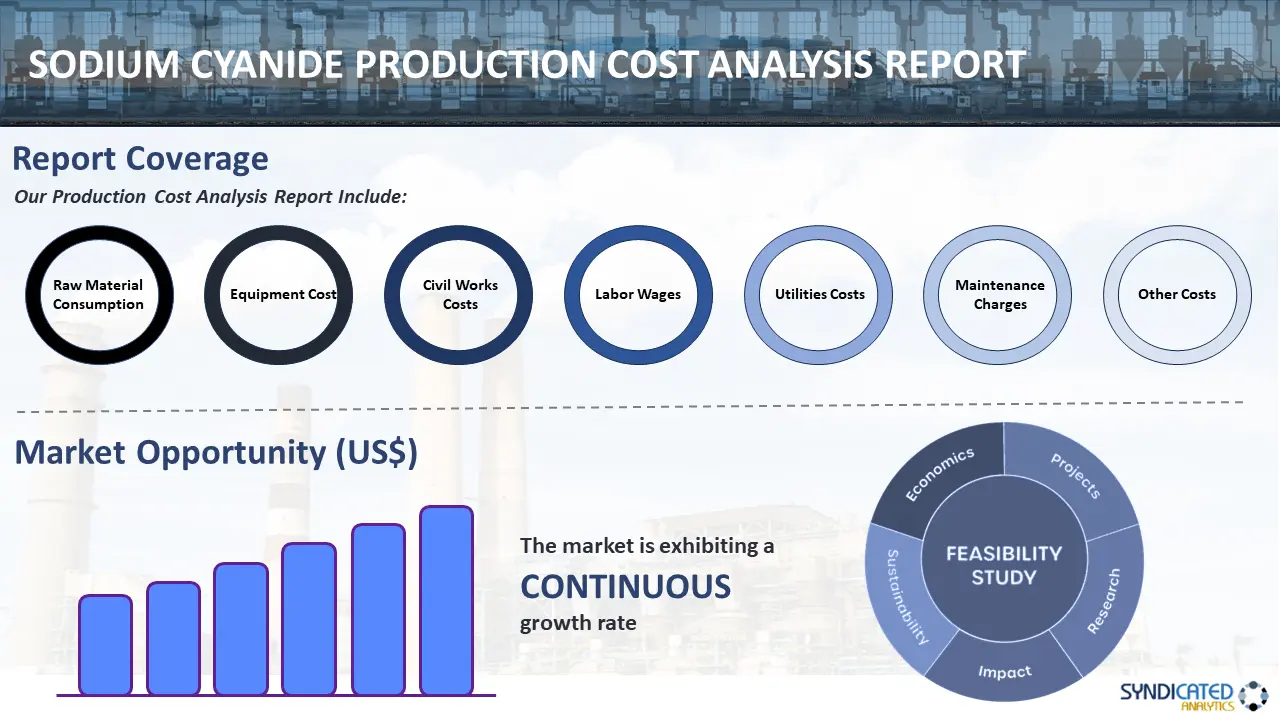
Sodium Cyanide Production Cost Analysis Report 2025 Edition: Industry Trends, Capital Investment, Price Trends, Manufacturing Process, Raw Materials Requirement, Operating Cost, and Revenue Statistics
Report Overview
The report by Syndicated Analytics, titled “Sodium Cyanide Production Cost Analysis Report 2025 Edition: Industry Trends, Capital Investment, Price Trend, Manufacturing Process, Raw Materials Requirement, Operating Cost, and Revenue Statistics,” presents an exhaustive analysis of both the operational expenses and revenue projections for setting up a sodium cyanide manufacturing facility. Resulting from thorough primary and secondary research efforts, this document offers an in-depth exploration of market dynamics and the effects of the COVID-19 pandemic at both global and regional scales. The study meticulously examines price fluctuations, the balance of mass against required raw materials, and the critical unit operations essential to the sodium cyanide production process. A detailed assessment of capital expenditures is provided, encompassing the breakdown of expenses related to raw materials, utilities, labor, packaging, transport, land acquisition, construction, and equipment. Additionally, the report forecasts profit margins and suggests strategies for setting optimal product prices. For those considering entering the sodium cyanide market or current stakeholders, this report serves as a vital tool.

Sodium Cyanide Market Overview:
The market for sodium cyanide is experiencing steady growth, bolstered by the rising gold mining activity. It is used in the extraction process of gold from ore, mostly in heap leaching and cyanidation techniques. Fluctuations in gold prices and the growing demand for the precious metal directly impact the usage of sodium cyanide. Besides this, the elevating requirement for gold in jewelry, investment, and industrial applications propels increased gold mining activity and, consequently, sodium cyanide utilization. For instance, Canada is among the top four gold producers, behind China, Australia, and Russia. As per the USGS statistics, the country's production stands at around 220 tons, representing about 7% of global production, owing to increased output at the Detour Lake, Canadian Malartic, Meadowbank Complex, Meliadine, Eagle Gold, and Young-Davidson mines.
Economic conditions, particularly in major gold-producing regions, such as Australia, China, the United States, and South Africa, positively influence the demand for sodium cyanide. Inflating investments, industrialization, and infrastructure development contribute to increased gold production and mining activity, thereby catalyzing the global market for sodium cyanide. For instance, more than 21 countries in Africa, the third-largest producer of gold globally, are involved in gold mining. Ghana, the second-largest supplier of gold in Africa and one of the world's top producers, generated about 90 metric tons of gold.
Sodium Cyanide Market Trends:
Increasing Demand for Gold Extraction
Gold continues to be a sought-after precious metal for several purposes, including investment, jewelry, and industrial applications. As a result, sodium cyanide is widely used for processing gold. In addition to this, the rising exploration of new gold deposits and the expansion of existing mining operations require this compound for ore processing, which is also catalyzing the market for sodium cyanide globally. For example, West Africa is a prime spot for gold exploration. It attracted an inflating number of investments from companies globally in the past few years, owing to the untouched mineral reserves present in the region. There is a significant growth in the gold assets in West Africa, with around 367 assets in the exploration stage, 24 assets under economic assessment, and 61 assets in the production or construction stage.
Moreover, Africa includes rich mineral sources, making it a hub for the global mining industry. Apart from South Africa, a significant mining sector, countries like Ghana, Mali, and Burkina Faso, also include fast growing mining industries.
Extensive Utilization in the Mining Industry
A substantial amount of sodium cyanide produced across the globe is utilized in mining and metallurgy, especially in extracting gold and silver. It is among the most economically viable, easily processable, and environmentally sustainable technologies for processing gold. Generally, gold is extracted from its ore using sodium cyanide through leeching. In this process, the ore is crushed into a fine powder using industrial machinery. Then, the dust is added to a sodium cyanide (NaCN) solution and processed. For instance, the federal government of Canada announced to spend around US$ 500,000 to promote northern mining, especially in Yukon, the Northwest Territories, and Nunavut.
Similarly, Sasol Limited agreed to sell its sodium cyanide business to a Czech-based subsidiary of Draslovka Holding for over US$ 95 Million. With this acquisition, Draslovka Holding intends to introduce new technologies and ensure a consistent and stable supply of cyanide to the mining sector.
Latest Industry News:
- Cyanco, a leading global producer of sodium cyanide for precious metal extraction, entered into a strategic partnership with Cycladex Ltd., a developer of a newly patented cyanide-free procedure to recover gold and silver. Both companies have established a funded joint technology development program and a revenue-sharing agreement on combined projects.
- Australian Gold Reagents (AGR) announced plans to expand its sodium cyanide production at its Kwinana, Western Australia facility to support the elevating global demand for gold. It will increase AGR's production capacity by circa 30,000 tons per annum from its existing production of more than 90,000 tons, with sodium cyanide to be used in gold mining operations across Australia, Asia, Africa, the Americas, and the Middle East.
This report is essential reading for entrepreneurs, investors, researchers, consultants, and business strategists with interests in the sodium cyanide industry. It offers a thorough examination of the current state of the industry and its future potential, supplying valuable information for informed decision-making and strategic planning. Serving as an invaluable resource, this report provides a detailed exploration of the sodium cyanide industry, making it an indispensable tool for those looking to establish a strong presence in this dynamic sector.
Market Analysis
This section delves into the dynamics of the sodium cyanide market, including overview, historical and current performance, and impact of COVID-19. It examines factors driving demand, identifies key market trends, and analyzes the price trend. This analysis provides stakeholders with critical insights into market opportunities and challenges.
| Market Overview | Provides a broad introduction to the sodium cyanide market, including its definition, applications, and the role it plays in various industries. |
| Historical and Current Market Performance | Examines the market's development over time, highlighting trends, growth patterns, and significant changes in the market landscape. |
| Impact of COVID-19 | Analyzes the effects of the global pandemic on the sodium cyanide market, including disruptions in supply chains, changes in demand, and long-term implications. |
| Market Forecast | Projects the future trajectory of the market based on current data, trends, and potential future developments. |
| Market Breakup by Segment | Segments the market based on product types, applications, or other relevant criteria, providing detailed insights into each segment's performance and prospects. |
| Market Breakup by Region | Discusses the market's geographical distribution, analyzing key regions and countries in terms of market size, growth opportunities, and challenges. |
| Price Trend | Sodium Cyanide Price Trend: Examines the historical, current, and forecasted price trend of sodium cyanide. Product Margins: Discusses the profitability and margins associated with sodium cyanide production and sales. |
Sodium Cyanide Manufacturing Process
The manufacturing process segment offers a detailed overview of the production of sodium cyanide, highlighting the technological methodologies employed, from raw material procurement to the final product. It outlines the sequence of operations involved and the equipment used, offering a comprehensive understanding of the manufacturing lifecycle.
| Product Overview | This section introduces sodium cyanide, outlining its properties, applications, and significance in various industries. The overview establishes a foundational understanding of the product's role and value in the market. |
| Detailed Process Flow | A comprehensive depiction of the sodium cyanide manufacturing process, from raw material intake to final product packaging, is provided. This includes a step-by-step guide through each stage of production, emphasizing critical control points and technological considerations. |
| Various Types of Unit Operations Involved | An examination of the unit operations integral to the manufacturing process. This segment delves into the technical aspects of each operation, detailing the equipment and methodologies employed. |
| Mass Balance and Raw Material Requirements | An analysis of the mass balance within the production process, highlighting the input of raw materials and output of final products and by-products. This section quantifies the raw materials required for a defined production volume, facilitating resource planning and optimization. |
Production Cost Analysis
This part of the report scrutinizes the various costs associated with the production of sodium cyanide, including raw material costs, utilities, labor, and overheads. It breaks down the plant costs into detailed categories, providing an in-depth look at the factors contributing to the total production cost and their implications on pricing and profitability.
| Currency | US$ (Information can also be provided in the local currency) |
| Pricing and Purchase Options | Single User License: US$ 3450 Five User License: US$ 4450 Corporate User License: US$ 5450 |
| Customization Scope | The report can also be customized based on the requirement of the customer |
| Post-Sale Analyst Support | 12-14 Weeks |
| Delivery Format | PDF and Excel through email (We can also provide the editable version of the report in PPT/Word format on special request) |
Key Questions Answered in This Report?
- What are the various unit operations involved in manufacturing sodium cyanide?
- What are the raw material requirements and costs in manufacturing sodium cyanide?
- What are the utility requirements and costs in manufacturing sodium cyanide?
- What are the manpower requirements and costs in manufacturing sodium cyanide?
- What are the packaging requirements and costs in manufacturing sodium cyanide?
- What are the transportation requirements and costs in manufacturing sodium cyanide?
- What are the land requirements and costs in manufacturing sodium cyanide?
- What are the construction requirements and costs in manufacturing sodium cyanide?
- What are the profit margins in sodium cyanide?
- What should be the pricing mechanism of sodium cyanide?
Seeking a Tailored Project Report?
While we have endeavored to create a comprehensive report, we acknowledge that each stakeholder may possess unique requirements. In light of this, we offer the option to customize the report to align with your specific needs. You can convey your business specifications to our consultants, and we will furnish you with a personalized scope tailored precisely to your requirements. Some of the common customizations that our clients often request include:
- Tailoring the report to suit the country/region where you intend to establish your plant.
- Adapting the manufacturing capacity of the plant to meet your specific needs.
- Customizing machinery suppliers and costs to align with your requirements.
- Incorporating any additional elements into the existing scope as per your specifications.
Why Choose Syndicated Analytics:
- Our reports offer valuable insights to stakeholders, enabling them to make informed business decisions confidently.
- We maintain a robust network of consultants and domain experts spanning over 100 countries across North America, Europe, Asia Pacific, South America, Africa, and the Middle East.
- Our extensive database includes equipment and raw material suppliers from major continents, ensuring comprehensive coverage.
- We diligently track and update critical factors such as land costs, construction costs, utility expenses, labor costs, and more, across more than 100 countries worldwide.
- Syndicated Analytics is the trusted partner of choice for leading corporations, governments, and institutions globally. Our clientele ranges from small startups to Fortune 500 companies.
- Our dedicated in-house team comprises experts in various fields, including engineers, statisticians, modeling specialists, chartered accountants, architects, and more. They play a pivotal role in developing, expanding, and optimizing sustainable manufacturing facilities worldwide.
Purchase Options
Ask For Customization
Personalize this research
Triangulate with your own data
Get data as per your format and definition
Gain a deeper dive on a specific application, geography, customer or competitor
Any level of personalization
Get in Touch
Call us on
US: +1-213-316-7435
Uk: +44-20-8040-3201
Drop us an email at
sales@syndicatedanalytics.com